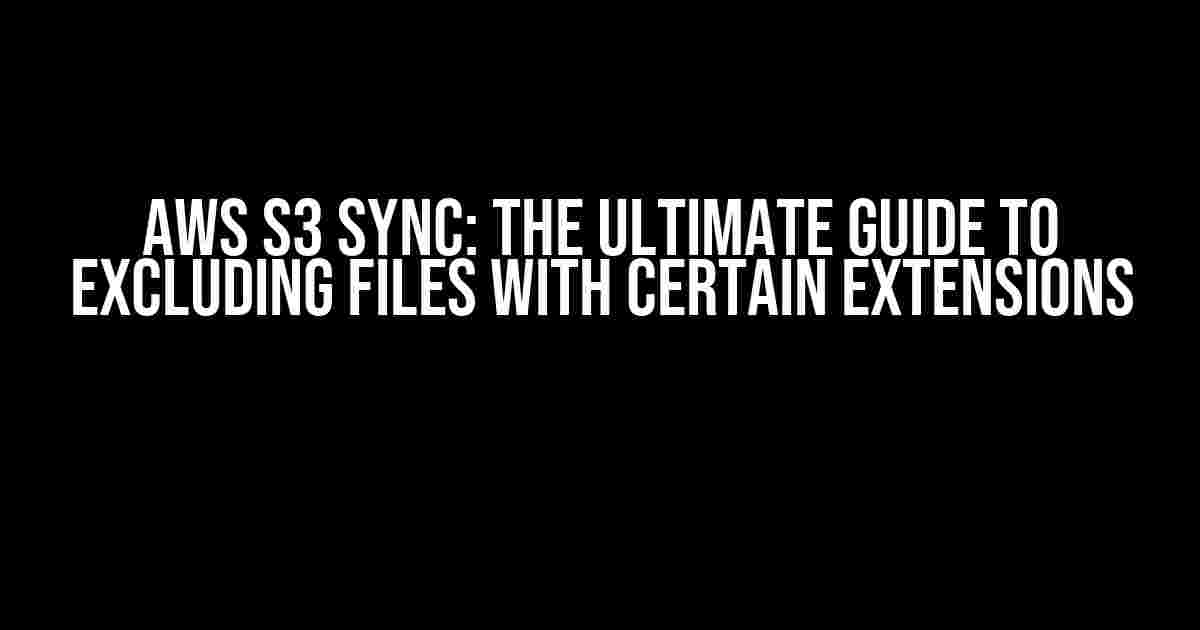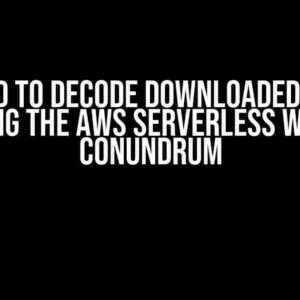Are you tired of dealing with unwanted files in your AWS S3 bucket? Do you struggle to sync your files while excluding those pesky files with certain extensions? Well, buckle up, friend, because today we’re going to dive into the world of AWS S3 sync and explore the best practices for excluding files with specific extensions.
What is AWS S3 Sync?
AWS S3 sync is a powerful tool that allows you to synchronize your local files with your AWS S3 bucket. It’s a convenient way to keep your files up-to-date across different environments, but it can also be a nightmare when dealing with unwanted files.
The Problem: Syncing Unwanted Files
Imagine you have a directory with hundreds of files, including some annoying .tmp files that you don’t need. When you run the AWS S3 sync command, these unwanted files get uploaded to your bucket, taking up valuable storage space and cluttering your directory.
But fear not, dear reader, for we have a solution. In this article, we’ll show you how to exclude files with certain extensions using the AWS S3 sync command.
The Solution: Excluding Files with Certain Extensions
The AWS S3 sync command has a handy option called `–exclude` that allows you to specify patterns to exclude from the sync process. This option is case-sensitive, so make sure to use the correct case when specifying your patterns.
Excluding Files with a Single Extension
To exclude files with a single extension, you can use the following syntax:
aws s3 sync . s3://my-bucket --exclude *.tmpIn this example, we’re telling AWS S3 sync to exclude all files with the .tmp extension. The dot at the beginning of the pattern is important, as it specifies that we want to exclude files with the exact extension, rather than files that contain the extension somewhere in their name.
Excluding Files with Multiple Extensions
What if you need to exclude files with multiple extensions? No problem! You can specify multiple patterns separated by commas:
aws s3 sync . s3://my-bucket --exclude *.tmp,*.log,*.bakIn this example, we’re excluding files with the .tmp, .log, and .bak extensions.
Excluding Files with Wildcard Patterns
What if you want to exclude files with a certain prefix or suffix? You can use wildcard patterns to achieve this:
aws s3 sync . s3://my-bucket --exclude *_backup*In this example, we’re excluding files that contain the string `_backup` anywhere in their name.
Advanced Exclusion Patterns
So far, we’ve covered basic exclusion patterns. But what if you need to exclude files based on more complex criteria? AWS S3 sync allows you to use advanced exclusion patterns using regular expressions.
Regular Expressions 101
Regular expressions (regex) are a powerful way to match patterns in strings. If you’re new to regex, don’t worry – we’ll cover the basics.
A regex pattern consists of a series of characters and special characters that define a search pattern. Here are some common regex characters:
| Character | Description |
|---|---|
| . | Matches any character |
| * | Matches zero or more repetitions of the preceding pattern |
| ? | Matches zero or one repetition of the preceding pattern |
| + | Matches one or more repetitions of the preceding pattern |
| [ ] | Matches any character within the brackets |
| ^ | Matches the start of a string |
| $ | Matches the end of a string |
Excluding Files with Regex Patterns
Now that we’ve covered the basics of regex, let’s see how we can use regex patterns to exclude files:
aws s3 sync . s3://my-bucket --exclude '^[^.]+$'In this example, we’re excluding files that don’t have a dot (.) in their name. This pattern matches files that don’t have an extension.
aws s3 sync . s3://my-bucket --exclude '^foo.*$'In this example, we’re excluding files that start with the string `foo`.
Common Scenarios
In this section, we’ll cover some common scenarios where excluding files with certain extensions comes in handy.
Excluding Temporary Files
Temporary files can clutter your bucket and waste storage space. Here’s an example of how to exclude temporary files:
aws s3 sync . s3://my-bucket --exclude *.tmp,*.temp,*.tmp~Excluding Log Files
Log files can be large and unnecessary in your bucket. Here’s an example of how to exclude log files:
aws s3 sync . s3://my-bucket --exclude *.log,*.log.gz,*.log.zipExcluding Backup Files
Backup files can take up valuable storage space in your bucket. Here’s an example of how to exclude backup files:
aws s3 sync . s3://my-bucket --exclude *_backup*,*.bak,*.oldConclusion
AWS S3 sync is a powerful tool that can help you manage your files in the cloud. By using the `–exclude` option, you can exclude files with certain extensions, making your synchronization process more efficient and organized.
Remember, the key to mastering AWS S3 sync is to understand the power of exclusion patterns. With a little creativity and some regex magic, you can exclude files with ease and keep your bucket tidy.
So, the next time you’re struggling with unwanted files in your AWS S3 bucket, remember: exclusion is the key to a happier, more organized you!
Frequently Asked Question
AWS S3 sync not excluding files with certain extensions got you stumped? We’ve got the answers!
Q1: Why does AWS S3 sync not exclude files with certain extensions?
By default, AWS S3 sync command does not exclude files based on their extensions. You need to specify the excluded files or directories explicitly using the `–exclude` option.
Q2: How do I exclude files with a specific extension using AWS S3 sync?
You can use the `–exclude` option followed by the extension of the file you want to exclude. For example, to exclude all `.txt` files, use the command: `aws s3 sync . s3://my-bucket/ –exclude “*.txt”`.
Q3: Can I exclude multiple file extensions using AWS S3 sync?
Yes, you can exclude multiple file extensions by separating them with a space. For example, to exclude both `.txt` and `.docx` files, use the command: `aws s3 sync . s3://my-bucket/ –exclude “*.txt” “*.docx”`.
Q4: How do I exclude files with certain extensions recursively using AWS S3 sync?
To exclude files with certain extensions recursively, you can use the `–exclude` option with the `**` wildcard. For example, to exclude all `.txt` files recursively, use the command: `aws s3 sync . s3://my-bucket/ –exclude “**/*.txt”`.
Q5: Can I use a patterns file to exclude files with certain extensions using AWS S3 sync?
Yes, you can use a patterns file to exclude files with certain extensions. Create a file with the patterns you want to exclude, one per line, and then specify the file using the `–exclude` option followed by the `@` symbol and the file path. For example: `aws s3 sync . s3://my-bucket/ –exclude=”@./exclude-patterns.txt”`.


